沪教版牛津英语高二下_Unit__(1)知识点讲解 练习教学文案
沪教版牛津英语高二下_Unit__(1)知识点讲解练习题.doc
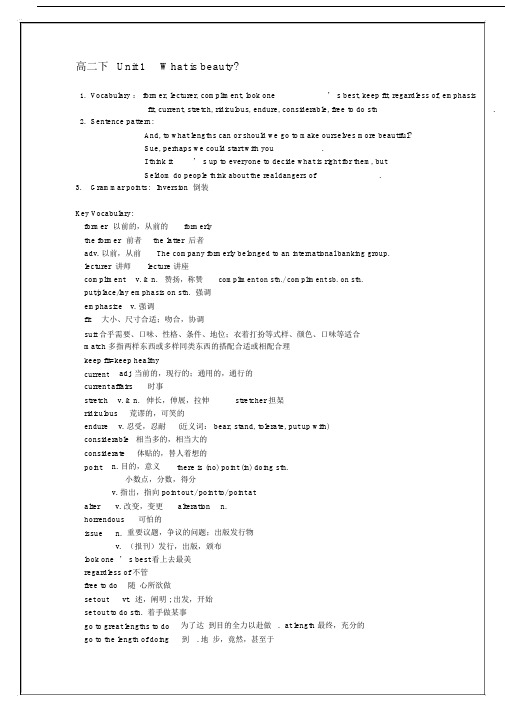
高二下Unit 1 What is beauty?1. Vocabulary : former, lecturer, compliment, look one ’ s best, keep fit, regardless of, emphasisfit, current, stretch, ridiculous, endure, considerable, free to do sth .2. Sentence pattern:And, to what lengths can or should we go to make ourselves more beautiful?Sue, perhaps we could start with you .I think it ’ s up to everyone to decide what is right for them, butSeldom do people think about the real dangers of .3.Grammar points: Inversion 倒装Key Vocabulary:former以前的,从前的formerlythe former前者the latter 后者adv. 以前,从前The company formerly belonged to an international banking group.lecturer 讲师lecture 讲座compliment v. & n.赞扬,称赞compliment on sth./ compliment sb. on sth.put/place/lay emphasis on sth. 强调emphasize v. 强调fit大小、尺寸合适;吻合,协调suit 合乎需要、口味、性格、条件、地位;衣着打扮等式样、颜色、口味等适合match 多指两样东西或多样同类东西的搭配合适或相配合理keep fit=keep healthycurrent adj. 当前的,现行的;通用的,通行的current affairs 时事stretch v. & n. 伸长,伸展,拉伸stretcher 担架ridiculous 荒谬的,可笑的endure v. 忍受,忍耐(近义词: bear, stand, tolerate, put up with)considerable 相当多的,相当大的considerate 体贴的,替人着想的point n. 目的,意义there is (no) point (in) doing sth.小数点,分数,得分v. 指出,指向point out / point to/ point atalter v. 改变,变更alteration n.horrendous 可怕的issue n. 重要议题,争议的问题;出版发行物v. (报刊)发行,出版,颁布look one ’ s best看上去最美regardless of 不管free to do 随心所欲做set out vt. 述,阐明 ; 出发,开始set out to do sth. 着手做某事go to great lengths to do 为了达到目的全力以赴做. at length 最终,充分的go to the length of doing 到 .地步,竟然,甚至于in order to../ so as toin order that/ so that...start with you从你开始thank sb. for因为 . 而感thanks to =because of= as a result of= due to.. 因为,由于cosmetic surgery整容外科手术cosmetician 化妆师,美容师up to: ①从事于I don’ t know what he is up to.②胜任He is not up to his work.③适于The quality of the construction is not up to the standard.④直到I haven’ t heard from him up to now.deal with处理,应付deal in出售,经营disorder n. 混乱,无次序sb. happen to do某人碰巧做 .It happens/happened that碰巧发生perspective n. 视角、观点,远景in a..perspective 以 .的视角观点来看in/ out of perspective合比例/不合比例be used to doing / be used to do/ used to doused to do---否定: used not to/ usedn’ tdidnto’ t use toquaint adj. 离奇的,古色古香的custom 风俗,习俗habit 个人习惯tradition传统practice惯例,惯常的做法judge from/by根据. 来判断obsession n. 沉迷,迷恋be obsessed with 对⋯迷恋倒装的情况:1. 在以 never, little, hardly, not only, few, not, seldom等否定副词开头的句子中,采用部分倒装。
牛津上海版高二英语第一单元知识点(K12教育文档)

愉快业绩进步,以下为牛津上海版高二英语第一单元知识点(word版可编辑修改)的全部内容。
学生杜昊程董雪婷年级高二教材版本牛津版6、在以never, little, hardly, not only, few, not, seldom等否定副词开头的句子中,采用部分倒装。
如不放在句首就不要倒装。
e.g. Little did he say at the meeting。
Never shall I forget the day when I joined the Army。
比较:I shall never forget the day when I joined the Army.7、用于以only所修饰的副词、介词短语或状语从句的句子中。
e。
g. Only when the war was over in 1918 was he able to get happily back to work.Only in this way can we learn English well。
注意:如果only后的词组不是状语,不需倒装。
e.g. Only Wang Lili knows this。
8、为了表达生动,有时把表地点、方位的副词,如 up, down, out, away, in等放在句首,同时把谓语动词放在主语之前.若主语为人称代词,主语和谓语动词的位置不变,只将副词放在句首.(完全倒装)e.g. Away hurried the boy.Out rushed the girl。
9、在虚拟结构中,条件从句的谓语含有were, had 和should这三个词时,可省去if,将这些词移至主语之前。
e。
g. Had I time (= If I had time), I would go and help you。
Were I you (= If I were you), I would go abroad.Should he come (=If he should come), tell him to ring me up。
牛津上海版高二英语第一单元知识点

牛津上海版高二英语第一单元知识点教师姓名司晓娜学科英语填写时间学生姓名杜昊程董雪婷年级高二教材版本牛津版课题名称倒装的运用+Unit1知识点上课时间重点难点全部倒装与部分倒装的用法及区分教学过程 Grammar英语最基本的语序是主语在前,谓语动词在后。
但有时由于句子结构的需要或表示强调,就要采用倒装形式。
将谓语动词完全移到主语之前称为完全倒装,只将助动词或情态动词放到主语之前称为部分倒装。
强调性倒装和以so, neither, nor开头的句子是高考例题的热点。
(1)倒装句的意义1、适应一定的语法结构的需要,主要是指疑问句句型结构的需要。
e.g. May I come in?Was the People’s Liberation Army founded in 1927?2、为了强调某一部分,而把这部分放到句首,构成倒装。
e.g. Never have I been late for school this term.So early did he come to school that no other students came.(2)倒装的使用情况1、在“there be” 结构里,there是引导词,主语在be后。
e.g. There is a box on the table.2、在疑问句中。
e.g. Is she singing in the classroom?What does your mother do?3、在here, there等副词开头的某些句子里(要用一般现在时态)。
如果主语是人称代词,主语和主要动词的词序不变。
(完全倒装)e.g. There goes the bell.Here is an apple for you.There she comes.4、重复倒装句型,用在以so, nor, neither开头,表示谓语所述的情况也适用于另一个人或一事物的肯定或否定句中。
《牛津英语(上海版)高中二年级第二学期》(课本S2B)讲解学习

2
Unit 1
Suffering to be beautiful
Read the transcript below from a radio programme called Head to Head.
Host: Good morning. Today’s topic is beauty. What is beauty? And, to what lengths
stretch/lips
stretch/necks
pierce/noses
1 These people have changed their appearance to be beautiful. What do you think of their appearance? Why?
2 How did people in ancient China change their appearance to look beautiful? 3 What do people do to change their appearance nowadays?
opinions? 3 Look at the title. What do you think they will be talking about?
C Scanning
Scan the transcript and complete these notes.
Ways of becoming ‘beautiful’ In the past: 1 removing your __________ (Europe) 2 stretching your ___________
B Skimming
Look at the picture below, skim the transcript on the ng page, and then answer the questions.
牛津高二英语第一单元知识点(上海版)

教师姓名司晓娜学科英语填写时间学生姓名杜昊程董雪婷年级高二教材版本牛津版课题名称倒装的运用+Unit1知识点上课时间重点难点全部倒装与部分倒装的用法及区分教学过程 Grammar英语最基本的语序是主语在前,谓语动词在后。
但有时由于句子结构的需要或表示强调,就要采用倒装形式。
将谓语动词完全移到主语之前称为完全倒装,只将助动词或情态动词放到主语之前称为部分倒装。
强调性倒装和以so, neither, nor开头的句子是高考例题的热点。
(1)倒装句的意义1、适应一定的语法结构的需要,主要是指疑问句句型结构的需要。
e.g. May I come in?Was the People’s Liberation Army founded in 1927?2、为了强调某一部分,而把这部分放到句首,构成倒装。
e.g. Never have I been late for school this term.So early did he come to school that no other students came.(2)倒装的使用情况1、在“there be”结构里,there是引导词,主语在be后。
e.g. There is a box on the table.2、在疑问句中。
e.g. Is she singing in the classroom?What does your mother do?3、在here, there等副词开头的某些句子里(要用一般现在时态)。
如果主语是人称代词,主语和主要动词的词序不变。
(完全倒装)e.g. There goes the bell.Here is an apple for you.There she comes.4、重复倒装句型,用在以so, nor, neither开头,表示谓语所述的情况也适用于另一个人或一事物的肯定或否I.学校书本知识同步复习Ⅱ. .本次课内容讲解Ш.学生疑难问题解决Ⅳ.练习定句中。
上海牛津版英语高二下册Unit1U1知识点总复习

学员编号:年级:高二课时数:学员姓名:辅导科目:英语学科教师:授课类型T Unit1(牛津S2A)基础知识梳理星级★★★教学目标1、使学生能够基本掌握牛津高二下Unit1中的基础词汇及重要句型授课日期及时段T同步-U1基础知识梳理(建议2-5分钟)Give the student the following pictures to describe these sports in winter with their own expressions. Then write the key words beside the picture.SkiingskatingWhat about your favorite sport?批注:谈论好之后让学生简要介绍一下自己喜欢的运动是什么,并解释喜欢的原因,最后可以将一些关键的词和短语汇总,作为家庭作业布置成一篇小作文。
下节课提交修改。
1(建议25分钟)Let’s learn the following language points about sports and try to find out the key words and phrases in the reading and more reading. GO! GO! GO!一、词汇Words1. former adj.以前的;从前的e.g. She chose the former umbrella because of the color. 因为颜色,她选择了以前的雨伞。
【知识拓展】the former 前者the latter 后者e.g. If I have to choose between fish and chicken, I'd like the former.如果我必须在鱼和鸡肉之间作选择,我喜欢前者。
formerly adv.以前,从前e.g. The company formerly belonged to an international banking group.这家公司以前属于一个国际金融组织。
沪教版牛津英语高二下_Unit_知识点及练习
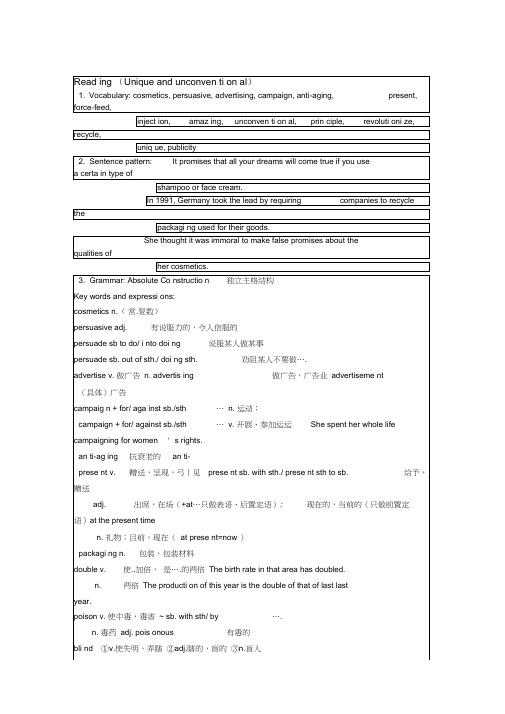
force-feed v. 强迫进食the sick animal refused to eat, and had to be force-fed.injection n. 注射--------- v. inject 给…注射;投入(资金);添加,增加(某种品质)drip v. 滴入amaz ing 令人惊奇的,令人惊喜的unconventional adj. 打破传统的,新奇的------ 反义词:conventional 因循守旧的prin ciple n. 规则,原则、prosper v. 繁荣,使兴旺adj. prosperous n. prosperityrevoluti onize v. 改革,革命n. revoluti onreform n. & v. 改革limitatio n n. 局限,缺陷----- v. & n. limitrecycle v. 回收,再利用refill v. 再装满(灌满)unique adj. 独一无二的,独特的Every snowflake is unique---no tow are the same.每一瓣雪花都是独一无二的。
remarkable adv. 不寻常的,出类拔萃的His remarkable achieveme nt in scie nticehas brougth him great honour.alternative adj. 供选择的,二者择其一的n. 备用物global 全球的n. globe 球,球体the globe=the pla net=the earth 地球publicity n. 公众的注意,媒体的注意;名声,宣传publicize v. n. publicist 宣传人员)hold v. 举办,进行pro-e nvironment adj. 支持环保的sth. come true/ sb. realize sth. 实现(目标,理想)练习:1. Many things impossible for Chin ese to un dersta nd in the past are quitecom mon today.A. con sideri ngB. con sideredC. to be con sideredD. havi ng bee ncon sidered2. might be expected, the resp onse to the questi on was very mixed.A. AsB. ThatC. ItD. What3. The swimmer was very tired but he cross the finishing line.A. couldB. mightC. was able toD. succeeded4. He must be an gry, for we heard the glass on the floor.A. being broke nB. breakC. broke nD. to be broke n5. - What __ to_him ? --He had his leg broken while playing basketball.A. happe nedB. took placeC. broke n outD. washappe ning7. If Harry did not atte nd the conference last ni ght, he too much work todo.A. must have hadB. must haveC. had hadD. had to have had8. I know Jane quite well and n ever doubt she can do a good job for it.A. thatB. whetherC. ifD. whe n9. The official deeply in the case might be sentenced to death.A. i nvolvi ngB. hav ing in volvedC. i nvolvedD. havi ng bee nin volved10. We took our umbrella with us when we went out in order to us from a heavy rainA. banB. prohibitC. preserveD. protect11. The new law will come into on the day whe n it is passed.A. effectB. useC. serviceD. existe nee12. Many coun tries are in creas ing their use of n atural gas, wind and other formsof _______A. orig inB. en ergyC. powerD. source13. China is to be the most developed country sooner or later.A. likelyB. possibleC. probablyD. perhaps14. Where is my pen? I it ?A. might loseB. would have lostC. should have lostD. must have lost15. I didn ' t hear the phone. I asleep. ______A. must beB. must have bee nC. should beD. should havebee n 二.verb-filling1. ___ (feel ) cold, he covered himself with a blanket, _____ (leave) only his arms___ (un cover)2. The gover nment is believed to be con sideri ng _ (pass) a law making it a crime___ (import) any kind of weap on.3. After _______ (technically improve), these trains are capable of attaining a veryhigh speed.4. David, who is helpful and agreeable, is a pers on n ever ___ (ig nore) whereverhe is.5. Only in the past 50 years with the revolution in diving equipment ______ scientists___ (be) able to study deep seas closely.6. With land prices ____ (reduce), I can afford a piece of land big eno ugh to parkmy car on.7. The discovery of new evide nee led to _______________ (the thief, catch)8. _____(meet) the grow ing dema nd for cars, the compa ny ope ned a new factory inthe State of Michigan in 1910.9. The CEOand the designer have overcome a lot of difficulty they had _____________ ( develop)the new project.10. The fireman ______ (rush) to the buildingon fire desperately _______ (hope) to saveas many people ______ (stra nd) in it as possible.11. The old man avoided ____ (touch) the hands __ (hold) out to help him as he___ (step) out of the boat.12. --Sorry _______ (interrupt) you. Please go on.--Where was I ?--You ________ (say) you didn ' t like your father ' s job. arrived13. The air liner from Beijing1. Do n't get off the bus un til it _____ .A. stopB. will stopC. stoppedD. has stopped2. "Where ____the recorder? I can't see it any where." "I ___ it right here. Butnow it's gone."A. did you put/have put C. had you put/was putt ing 3. Don't come toni ght. I would rather youA. come 4.B. cameB. have you put/put D. were you putt in g/have put tomorrow.C. will comeD. coming _____ you __A. Do/marry Are/marriedB. Have/marriedC. Have/bee n marriedD.5. When heall the n ewspapers, he'll go home.B. has soldC. will have sold 6. "Hurry up, you _____ on the pho ne. " "Oh, I'm coming. Thank you." A. are wan ted B. are being wan tedC. want 7. I _____ see you, but I did n't, for I had no time. A. had wan ted to B. has wan ted to C. wan ted 8. I _____ in Guang Zhou for six years by this October.A. have livedB. was livi ngC. will be livi ngA. sells D. will be sold D. are wan ti ng D. was wan tedD. shallhavelived9. By this time next year he _____ from the college.A. will be graduat ingB. should be graduati ngC. will have graduatedD. is graduati ng10. Our teacher told us that the earth _____ from west to east.A. turnsB. turnC. has turned11. It is high time you ____ in bed now.A. areB. were12. After a while an agreeme nt ____ .A. was arrived atB. was arrived inC. will beD. had tur nedD. would beC. was arrivedD. hasbee nat 3:00 .A. is about to arriveB. has arrivedC. arrivesD. is going to arrive 14. The research laboratory is going to _____ the new type of computer to use. A. take B. makeC. putD. send15. I ____ that he would be able to leave tomorrow, but it's begi nning to lookdifficult. A. hopeB. had hopedC. hopedD. am hop ing16. This liquid ____ the salt at room temperature.A. became mixed withB. was mixed byC. mixes withD. has bee n mixing by17. If they ___ e arlier tha n expected, they ____ h ere now.A. had started, would beB. started, might beC. had started, would have bee nD. will start, might have bee n18. Were I to do it, I ________ i t some other way.A. will doB. would doC. would have doneD. were to d19. We wish we ___ what you did whe n we were at high school.to the theatre last ni ght. B. would go C. had gone1. 我不知是否有任何东西可以取代母爱和关怀。
沪教版牛津英语高二下Unit知识点讲解练习
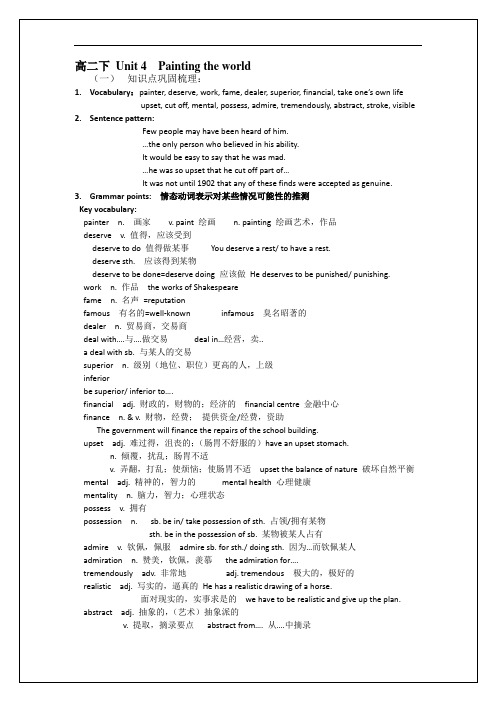
possession n. sb. be in/ take possession of sth.占领/拥有某物
sth. be in the possession of sb.某物被某人占有
admire v.钦佩,佩服admire sb. for sth./ doing sth.因为…而钦佩某人
vision n.视力;眼光;幻影He is a man of vision.有远见的人。
undoubtedly adv.无疑地=without doubt
doubt n.怀疑& v. I doubt whether/if… I don’t doubt that….
view v.观看view…as…
It was not until 1902 that any of these finds were accepted as genuine.
3.Grammar points:情态动词表示对某些情况可能性的推测
Key vocabulary:
painter n.画家v. paint绘画n. painting绘画艺术,作品
drive sb. mad使某人生气
be mad about/for sth.对….着迷
argue with/against sb. about sth.与某人争吵某事
argue about/against/over sth. / that….对某事进行辩论/辩论说…
superior n.级别(地位、职位)更高的人,上级
inferior
be superior/ inferior to….
financial adj.财政的,财物的;经济的financial centre金融中心
上海牛津版英语高二下册Unit1U1同步讲义教案及阅读长难句子分析

学员编号:年级:高二课时数:学员姓名:辅导科目:英语学科教师:授课类型T 词汇牛津高二下U1 C 长难句分析T 综合能力提升授课日期及时段教学内容一、词汇Words1、重点单词1. former adj.以前的;从前的She chose the former umbrella because of the colour. 因为颜色,她选择了以前的雨伞。
Bill Clinton, the former president of the USA, was born in 1946.美国前总统比尔·克林顿出生于1946年。
【拓展】the former 前者the latter 后者If I have to choose between fish and chicken, I'd like the former.如果我必须在鱼和鸡肉之间作选择,我喜欢前者。
formerly adv.以前,从前The company formerly belonged to an international banking group.这家公司以前属于一个国际金融组织。
2. lecturer n.讲师The lecturer had a wide range of knowledge, and a good sense of humour, as well.那位讲师不仅知识面广,而且富有幽默感。
3. compliment n.赞扬;称赞【搭配】compliment on sth. 对……的赞美,赞成Mary likes to hear compliments on her appearance.玛丽喜欢听对她仪表的赞美之词。
After class the teacher expressed her compliments on my writing.老师课后对我的写作大加赞扬。
【拓展】compliments n.致意,问候,祝贺(常用于传达音讯)My compliments to your wife.向你的夫人表示问候。
上海牛津高二第二学期unit1More reading

2. What is this article about? It is about aerobics.
Skim the passage and match each paragraph with its main idea.
Para. 1
Amount of aerobic exercise necessary
3. People who want to lose weight should F compete in marathons. People who want to lose weight should keep their pulse rates low and do moderate exercise for a longer time. 4. If you often do aerobic exercise, then you will feel more relaxed. T The benefits of aerobic exercise include having a stronger heart and less stress. 5. Most people never do any aerobic exercise. F Walking is the most common form of aerobic exercise. Most people do it every day!
45%的学生认为 体育浪费时间 锻炼使人疲劳 运动以后很兴奋,较长 时间不能复习功课 运动中可能会受伤
Dear editor, I’m writing to tell you about the discussion we’ve had about whether students of Senior 3 should take physical exercise. 55% of the students think they should take exercise every day, such as doing morning exercises, playing ping-pong and basketball, but it shouldn’t take up too much time. Proper exercise can build up one’s body and reduce diseases. What’s more, sports let their brains have a rest so that they can study effectively.
上海牛津版英语高二下册期中复习Unit1-Unit3U1-U3知识点总结

学员编号:年级:高二课时数:学员姓名:辅导科目:英语学科教师:授课类型T-U1~U3(牛津高二下)重点知识梳理教学目标使学生能够基本掌握牛津高二年级下册Unit1至Unit3中的基础词汇及重要句型,为期中考试做准备;星级★★★授课日期及时段T同步-U1~U3重点知识梳理(建议2分钟)子曰:学而时习之,________________I believe you can finish the above sentence quickly and correctly and it’s so familiar to you as all your teachers and both your parents often remind you of its importance. We have gone through three units till now, and you can recognize that the mid-term is coming, so in today’s class our focus is REVIEW. As usual, we start from the Words and Expressions.批注:利用“温故知新”的典故引出复习课的内容。
在课堂上引导学生培养平日积累总结的习惯。
复习课的导入语中包含了几个前3个单元的词组,可以让学生巩固加强。
复习课主要以学生回顾词义、用法为主。
因此讲义设置基本上以填写为主要形式,可适当根据学生情况添加词语默写等环节。
(建议25分钟)一、重要词汇Words1. compliment n.赞扬;称赞【搭配】compliment on sth. 对……的赞美,赞成Mary likes to hear compliments on her appearance.玛丽喜欢听对她仪表的赞美之词。
【拓展】compliments n.致意,问候,祝贺(常用于传达音讯)My compliments to your wife.向你的夫人表示问候。
上海牛津版高二下册英语Unit1 Suffering to be beautifulreading教案 S2B

Chapter1 Suffering to be beautifulReading教案一章节分析( Section Analysis)(一)综述本单元课文截取的是一次广播电话互动节目文稿。
旨在通过两位嘉宾对于“爱美”话题的讨论,让学生初步了解该领域,特别是时下流行的整形,丰胸等现象。
引导学生对此形成正确的态度。
本课的任务主要有两个:1.对课文进行整体理解。
培养学生略读(获取大意),扫读(整理有关信息),细读(分析文章结构,理出说话人观点)等阅读能力。
2.课堂活动拓展。
结合单元课文主题,要求学生整理并运用在阅读过程中所获新知识进行一场“爱美”的小型辩论比赛。
(二)阅读目标1.知识目标学习课文中重点词,词组,句型和语法。
2.能力目标提高学生的阅读理解能力和培养学生的阅读技巧。
在略读,扫读,细读的基础上,锻炼其寻找观点信息和提炼说话者观点的能力。
3.情感目标引导学生在“爱美”话题上形成正确的态度。
(三)教学方法采用任务型教学法和主题式教学法组织教学,通过比较,小组讨论等微观活动,以后最后的辩论形式达到教学效果。
(四)重点和难点1.词汇学习1)核心词汇●suffer●compliment●emphasis●endure●link●perspective●ridiculous●trend2)拓展词汇●horrendous●considerable●quaint3)词组和短语●go to (great) lengths●cosmetic surgery●agree with●be up to●in quotes●go in for●be free to do●give sb. a … perspective on sth.4) 句型学习●Judging people by their appearance is silly. 二教学设计( Teaching Designs)。
上海牛津版高二下册英语Unit1 Suffering to be beautiful—grammar学案S2A1
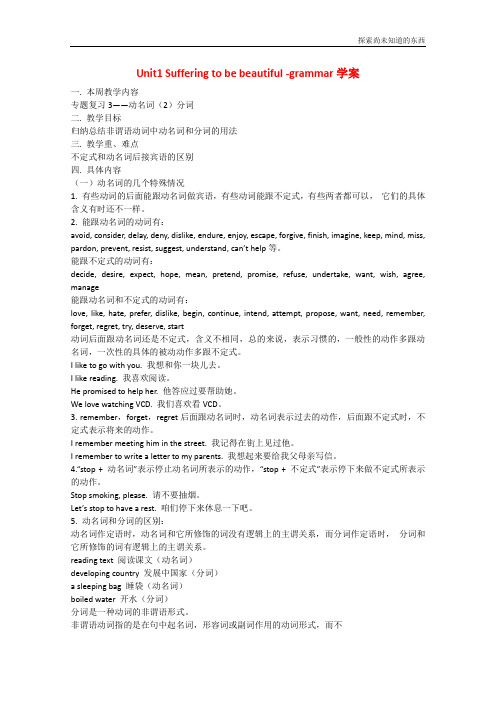
Unit1 Suffering to be beautiful -grammar学案一. 本周教学内容专题复习3——动名词(2)分词二. 教学目标归纳总结非谓语动词中动名词和分词的用法三. 教学重、难点不定式和动名词后接宾语的区别四. 具体内容(一)动名词的几个特殊情况1. 有些动词的后面能跟动名词做宾语,有些动词能跟不定式,有些两者都可以,它们的具体含义有时还不一样。
2. 能跟动名词的动词有:avoid, consider, delay, deny, dislike, endure, enjoy, escape, forgive, finish, imagine, keep, mind, miss, pardon, prevent, resist, suggest, understand, can’t help等。
能跟不定式的动词有:decide, desire, expect, hope, mean, pretend, promise, refuse, undertake, want, wish, agree, manage能跟动名词和不定式的动词有:love, like, hate, prefer, dislike, begin, continue, intend, attempt, propose, want, need, remember, forget, regret, try, deserve, start动词后面跟动名词还是不定式,含义不相同,总的来说,表示习惯的,一般性的动作多跟动名词,一次性的具体的被动动作多跟不定式。
I like to go with you. 我想和你一块儿去。
I like reading. 我喜欢阅读。
He promised to help her. 他答应过要帮助她。
We love watching VCD. 我们喜欢看VCD。
3. remember,forget,regret后面跟动名词时,动名词表示过去的动作,后面跟不定式时,不定式表示将来的动作。
牛津高二英语第一单元知识点(上海版)
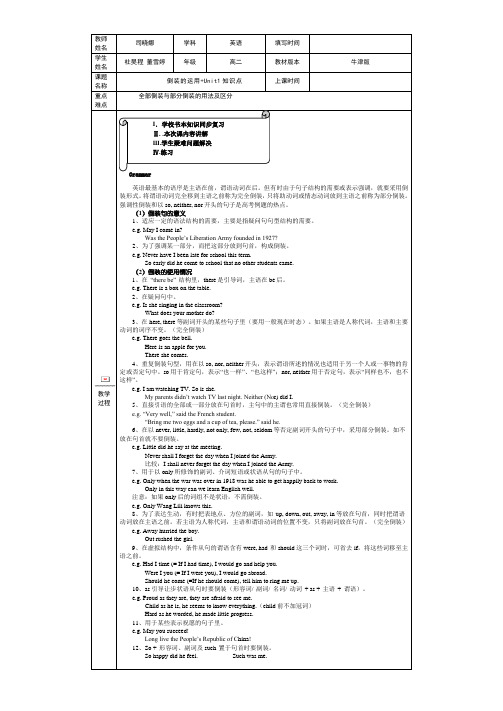
教师姓名司晓娜学科英语填写时间学生姓名杜昊程董雪婷年级高二教材版本牛津版课题名称倒装的运用+Unit1知识点上课时间重点难点全部倒装与部分倒装的用法及区分教学过程 Grammar英语最基本的语序是主语在前,谓语动词在后。
但有时由于句子结构的需要或表示强调,就要采用倒装形式。
将谓语动词完全移到主语之前称为完全倒装,只将助动词或情态动词放到主语之前称为部分倒装。
强调性倒装和以so, neither, nor开头的句子是高考例题的热点。
(1)倒装句的意义1、适应一定的语法结构的需要,主要是指疑问句句型结构的需要。
e.g. May I come in?Was the People’s Liberation Army founded in 1927?2、为了强调某一部分,而把这部分放到句首,构成倒装。
e.g. Never have I been late for school this term.So early did he come to school that no other students came.(2)倒装的使用情况1、在“there be” 结构里,there是引导词,主语在be后。
e.g. There is a box on the table.2、在疑问句中。
e.g. Is she singing in the classroom?What does your mother do?3、在here, there等副词开头的某些句子里(要用一般现在时态)。
如果主语是人称代词,主语和主要动词的词序不变。
(完全倒装)e.g. There goes the bell.Here is an apple for you.There she comes.4、重复倒装句型,用在以so, nor, neither开头,表示谓语所述的情况也适用于另一个人或一事物的肯定或否定句中。
so用于肯定句,表示“也一样”、“也这样”;nor, neither用于否定句,表示“同样也不,也不这样”。
上海牛津版高二下册英语Unit1 Suffering to be beautifulreading学案S2B

Chapter1 Suffering to Be Beautiful-reading学案I. Background InformationThis chapter is about “suffering to be beautiful”, and discuss many of the things that people have done in the past and that they do to change their bodies, trying to make them seem more beautiful. The issue is introduced in the form of a radio discussion programme, in which the radio presenter, Mary W. gives a neutral point of view, and two speakers put forward opposite viewpoints.II. New Words and ExpressionsI) ReadingNew Words1. suffer vi. 1) to feel pain or distress; sustain loss, injury, harm, or punishment 受苦,受损失2)to tolerate or endure evil, injury, pain, or death 忍受不幸,伤害,痛苦或死亡vt. 1) to undergo or sustain (sth. painful, injurious, or unpleasant) 遭受,承受2)to experience; undergo 经历;经受3)to ender or bear; stand忍受,容忍,承受suffering n. 苦楚,受难,a. 受苦的,患病的2. compliment 1)n. good wishes; regards 称赞,恭维,致意pay sb. a high compliment 非常恭维某人receive many compliments 受到许多称赞2)vt. 称赞,褒扬,恭维compliment sb. on sth.3. emphasis n. 1)stress, importance 强调,重点2)special attention or effort directed toward sth .着重对于某事物的特殊的注意或努力lay ~ on/upon; place ~ on; put ~ on/upon 着重,强调vt. emphasize4. current 1)n. 水(气、电)流,潮流,过程a ~ of air 空气流the ~ of thought 思想潮流2)a. 流行的,当前的overcome ~ difficulties克服当前的困难;~ English 现代通行英语;~ events 时事;~ fashions 现代服装式样;~ money通用货币5. perspective n. 1) in art, the word referring to the ability to draw objects so that they look real,with three dimensions (and not flat) 透视画法,透视图2)viewpoint, outlook 观点,看法3)view, esp. one stretching into the distance 远景,前途6. horrendous a. hideous; dreadful 可怕的,令人惊骇的7. endure vt. 1) to carry on through, despite hardships; undergo 度过,忍受,容忍2)to bear with tolerance 容忍vi. to continue in existence; last 持续,持久8. implant vt.灌输,注入,移植~ a drug capsule 植入一个药物胶囊n. sth. implanted/put in sth. else 灌输,注入,移植a dental ~牙齿的植入; a subcutaneous ~ 皮下移植9. ridiculous a. silly, foolish, laughable, stupid可笑的,荒谬的,荒唐的a ~ suggestion可笑的意见;be ~ in dress 穿着好笑的10. issue n. 1) the act or instance of flowing, passing, or giving out 流出,放出2)the act of circulating, distributing, or publishing by an office or official group发行,流通,分配3)a single copy of a periodical 期刊的单行本4)a point or matter of discussion, debate, or dispute 争议,争论11. stretch vi./vt. To spread or reach out, to draw out in length 伸出,展开,拉紧n. an act of ~ing; either of the straight sides of a race course伸出,直线跑道a. easily stretched 易伸缩的12. lobe n. the soft part at the bottom of an ear 耳垂13. tribe n. a social group comprising numerous families, clans or generations部落,种族14. skull n. the large structure made of bone inside your head 头颅15. case 1)事例2)场合,情况,事件3)病例in any case 无论如何in case 万一…的话;以免,以防in case of 在…情况下(in) nine cases out of ten十之八九,多半in no case 绝不in most /some cases 在大多数/某些情况下16. considerable a. 相当(大,多,重要)的17. quaint a. old-fashioned, funny, strange 古怪的,有趣的18. trend n. popular development, fashion 趋势,倾向vi. ~ to/ toward19. transplant n. sth. moved and put in a different place(e.g. moving hair from the back of thehead to the front)移植heart ~s 心脏移植v. 移植,使迁移20. anorexia n. 厌食症21. historian n. person who studies or teaches history 历史学家historic a. 有历史意义的,历史性的,历史上著名的historical a. 有关历史的,描述历史事件的22. quote n. 1)引用文/句(quotation)2)引号(as. pl.)quotation marksv. 引用词句、文章23. former a./n. at a previous time, not now 前者的,前者(A)latter 后者的,后者Expressions1. welcome to ‘Head to Head’ 欢迎收听《人与人》节目2. go to (great) lengths 竭尽全力3. make oneself more beautiful 使自己更漂亮4. in quotes 在引号中5. agree with sb./what sb. says 同意…6. suffer from 忍受,遭受7. on the earth 在地球上8. be up to sb.由某人决定9.keep oneself fit 使自己保持健康10. put emphasis on 把重点放在; too much emphasis过多强调11. be right for sb. 适合某人12. cosmetic surgery 整容手术13. fit society’s current ideas 符合社会的现代潮流14. go in for 喜欢;从事15. Southeast Asia 东南亚16. look back (on/upon/to) 回顾17. push sb. into …催促某人做…18. Judge people by their appearance.以貌取人19. set out 1)表明(想法,理由) 2)动身,出发3) ~to do 想开始做…,着手…20. take the first call 接听第一个电话21. (be) on the line 在接电话或打电话进来22. make tattoo 文身23. give sb. a brief historical perspective on sth. 从历史的角度给某人简单地讲述有关……24. start with 从…开始25. come along 出现,到来;进展,改进,提高;一起去(或来)II) More Language InputNew words1. aerobics n. 有氧运动aerobic a. 好氧的, 有氧运动的2. beneficial a. having good effect, helpful 有益的,有帮助的be ~ to the health 对身体有益n. benefit 利益,恩惠be of ~ to 对…有益v. 对…有益,有利于~ sb. …受益匪浅;~ from/by 从…中受益3. rate 比率;率at the ~ of 以…速度; birth-rate 出生率4. muscle n. 肌肉a. muscular 肌肉(发达)的5. response n. 1) answer 回答,答复(~ to)2) 反应,回响(~ to)v. respond (~ to)6. efficient a. 有效率的,最经济的,有能力的c.f. effective a. 有成效的,有力的,印象深刻的7. productive a. 生产的,能产的,多产的,有用的,有生产价值的8. rhythmic a. having a regular repeated pattern of sounds or movements 有韵律的,有节奏的Expressions1. aim at 把目标对准2. at a higher rate 以更高的速率;以较高价格3. increase the strength of heart and lungs 增强心肺力量4. reduce blood pressure 降低血压5. reduce the risk of heart attack降低心脏病的风险6. give sb. more energy 给人以更多的能量7. slow down 让…慢下来~ the aging process 延缓衰老的过程8. achieve a higher stand 达到更高的水平9. in nature 本质上10. in a word 总而言之;一句话11. lead to 导致(result in)12. to music 合着音乐III. Some additional exercisesI) Translation1、保持自己的身体健康是很重要的。
上海牛津英语高二下知识点总结

上海牛津英语高二下知识点总结高二下学期是英语学习的重要阶段,在这个阶段,学生需要掌握并巩固各种知识点,以提高英语水平。
本文将总结上海牛津英语高二下学期的知识点,帮助同学们更好地备考和复习。
一、语法知识点1. Unit 1 - Verb tenses在这个单元中,我们学习了各种时态的用法,如一般现在时、一般过去时、一般将来时等。
需要注意动词变位及其用法。
2. Unit 2 - Modal verbs这个单元主要学习了情态动词的用法,如can、may、must等。
需要掌握其肯定、否定和疑问句形式的构成,以及不同情景下的用法。
3. Unit 3 - Conditional sentences学习条件句的结构和用法,包括零条件句、一般条件句和虚拟条件句。
需要掌握不同条件句的构成方式和使用时的注意事项。
4. Unit 4 - Passive voice学习被动语态的构成和用法,需要理解主动语态与被动语态的转换,以及不同时态下的被动语态形式。
5. Unit 5 - Reported speech学习间接引语的用法,即将直接引语转换成间接引语的方式,包括陈述句、疑问句和祈使句的转换方法。
6. Unit 6 - Adjectives and adverbs学习形容词和副词的用法,包括比较级和最高级的构成方法,以及修饰名词和动词的不同用法。
二、阅读技巧和写作技巧1. 阅读技巧高二下学期的阅读主要包括理解和分析一些文章、短篇故事以及文章中的词汇和句子结构。
学生需要学会阅读理解,捕捉关键信息和理解文章的上下文。
2. 写作技巧在写作方面,学生需要掌握叙述、说明和议论文的写作技巧。
需要注意段落的结构,使用适当的连接词和过渡词,保持语句的连贯性和清晰性。
三、词汇和短语1. 单词记忆学生需要掌握并记忆高二下学期所学的重点词汇,包括名词、动词、形容词、副词等,以及一些常用短语的使用。
2. 词汇拓展扩大词汇量,学习一些同义词、反义词、词组和习惯用法,以便在日常学习和写作中更加灵活地运用。
- 1、下载文档前请自行甄别文档内容的完整性,平台不提供额外的编辑、内容补充、找答案等附加服务。
- 2、"仅部分预览"的文档,不可在线预览部分如存在完整性等问题,可反馈申请退款(可完整预览的文档不适用该条件!)。
- 3、如文档侵犯您的权益,请联系客服反馈,我们会尽快为您处理(人工客服工作时间:9:00-18:30)。
1. Here
A. comes Li Ming’s car B. come Li Ming’s car
e.g. Little did he say at the meeting.
Never shall I forget the day when I joined the Army.
2.为了表达生动,有时把表地点、方位的副词,如up, down, out, away, in等放在句首,同时把谓语动词全部放在主语之前。若主语为人称代词,主语和谓语动词的位置不变,只将副词放在句首。(完全倒装)e.g. Away hurried the boy. Out rushed the girl.
match多指两样东西或多样同类东西的搭配合适或相配合理
keep fit=keep healthy
current adj.当前的,现行的;通用的,通行的
current affairs时事
stretch v. & n.伸长,伸展,拉伸stretcher担架
ridiculous荒谬的,可笑的
endure v.忍受,忍耐(近义词:bear, stand, to out of perspective合比例/不合比例
be used to doing / be used to do/ used to do…
used to do---否定:used not to…/ usedn’t to didn’t use to…
quaint adj.离奇的,古色古香的
horrendous可怕的
issue n.重要议题,争议的问题;出版发行物
v.(报刊)发行,出版,颁布
look one’s best看上去最美
regardless of不管
free to do…随心所欲做…
set out vt.陈述,阐明;出发,开始
set out to do sth.着手做某事
go to great lengths to do…为了达到目的全力以赴做…. at length最终,充分的
Seldom do people think about the real dangers of….
3.Grammar points:Inversion倒装
Key Vocabulary:
former以前的,从前的formerly
the former前者the latter后者
adv.以前,从前The company formerly belonged to an international banking group.
considerable相当多的,相当大的
considerate体贴的,替人着想的
point n.目的,意义there is (no) point (in) doing sth.
小数点,分数,得分
v.指出,指向point out / point to/ point at
alter v.改变,变更alteration n.
④直到I haven’t heard from him up to now.
deal with处理,应付
deal in出售,经营
disorder n.混乱,无次序
sb. happen to do…某人碰巧做….
It happens/happened that…碰巧发生…
perspective n.视角、观点,远景in a…..perspective以….的视角观点来看
cosmetic surgery整容外科手术
cosmetician化妆师,美容师
up to:①从事于I don’t know what he is up to.
②胜任He is not up to his work.
③适于The quality of the construction is not up to the standard.
高二下Unit 1 What is beauty?
1.Vocabulary:former, lecturer, compliment, look one’s best, keep fit, regardless of, emphasis
fit, current, stretch, ridiculous, endure, considerable, free to do sth….
custom风俗,习俗
habit个人习惯
tradition传统
practice惯例,惯常的做法
judge…from/by…根据….来判断
obsession n.沉迷,迷恋be obsessed with…对…迷恋
倒装的情况:
1.在以never, little, hardly, not only, few, not, seldom等否定副词开头的句子中,采用部分倒装。如不放在句首就不要倒装。(部分倒装)
2.Sentence pattern:
And, to what lengths can or should we go to make ourselves more beautiful?
Sue, perhaps we could start with you….
I think it’s up to everyone to decide what is right for them, but…
lecturer讲师lecture讲座
compliment v. & n.赞扬,称赞compliment on sth./ compliment sb. on sth.
put/place/lay emphasis on sth.强调…
emphasize v.强调
fit大小、尺寸合适;吻合,协调
suit合乎需要、口味、性格、条件、地位;衣着打扮等式样、颜色、口味等适合
go to the length of doing…到….地步,竟然,甚至于…
in order to../ so as to…
in order that/ so that...
start with you从你开始
thank sb. for ….因为…而感谢…
thanks to =because of= as a result of= due to..因为,由于
